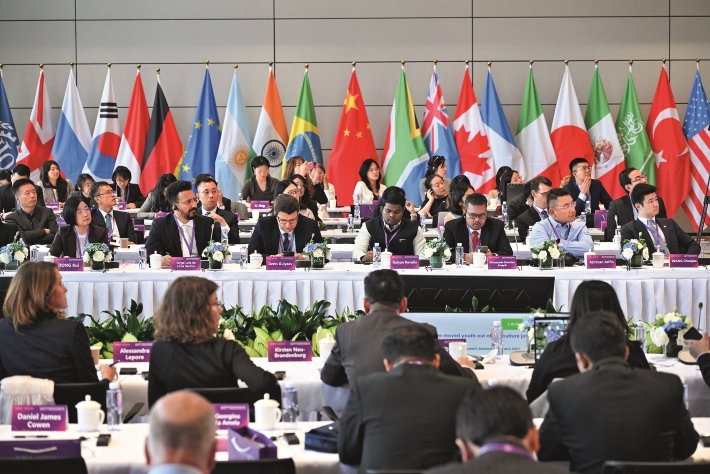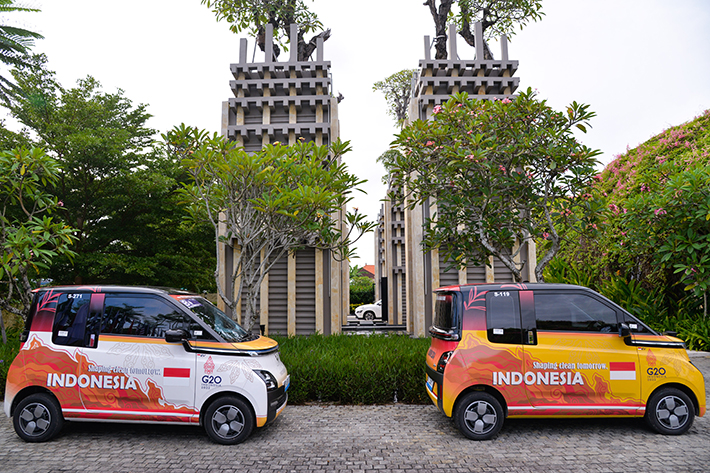|
||||||||||
| Home Top News Economy/Tech Culture/Sports China in Foreign Eyes Green Development Videos Intangible Cultural Heritages |
|
||||||||||
| Home Top News Economy/Tech Culture/Sports China in Foreign Eyes Green Development Videos Intangible Cultural Heritages |
| ChinAfrica |
| Building Consensus in an Era of Division |
| From financial reform to climate action, the G20 is striving to make global governance more inclusive, representative and equitable |
| By Li Xiaoyu | VOL. 17 November 2025 ·2025-11-03 |

South African President Cyril Ramaphosa speaks at the G20 Foreign Ministers’ Meeting in Johannesburg, South Africa, on 20 February (XINHUA)
When the G20 was created in 1999 in the wake of the Asian financial crisis, few imagined it would one day become the nerve centre of global governance. Twenty-six years later, the G20 members, which represent 85 percent of the global GDP and two-thirds of the world population, are once again navigating a turbulent era marked by geopolitical rivalry, economic fragmentation and widening inequality.
At the end of 2024, South Africa assumed the presidency of the G20. The timing could hardly be more apt. From rescuing banks to shaping climate finance, the G20 has evolved from a crisis management mechanism into a forum where power is increasingly shared and where the Global South is finding a stronger collective voice.
Financial firefighting
The G20 was born out of crisis and shaped by crisis. In 1999, in response to the turmoil sweeping Asian markets, then Canadian Minister of Finance Paul Martin and US Secretary of the Treasury Lawrence Summers launched it as an informal dialogue mechanism among finance ministers and central bank governors.
The 2008 global financial crisis transformed the group’s role overnight. The first G20 Leaders’ Summit in Washington that year marked a historic moment. Emerging economies like China, India and Brazil took their seats as equals alongside the G7. The London Summit in 2009 injected over $1 trillion into the world economy and created the Financial Stability Board to oversee systemic risks, while the Pittsburgh Summit later that year elevated the G20 as the premier forum for international economic cooperation.
Between 2010 and 2024, the agenda broadened dramatically, from macroeconomic coordination to digital transformation, global health, climate action and sustainable growth, expanding the G20’s mandate from short-term stabilisation to long-term governance. Frameworks such as the Strong, Sustainable and Balanced Growth Framework and the Mutual Assessment Process gave the G20 institutional depth that now anchors its policymaking.

The 2024 G20 Entrepreneurship Roundtable is held at the School of Economics and Management of Tsinghua University in Beijing on 15 October 2024 (CNS)
Rise of the Global South
No country illustrates the G20’s transformation more vividly than China. The 2016 Hangzhou Summit under China’s presidency marked a turning point. China called for “an innovative, invigorated, interconnected and inclusive world economy,” aligning G20 macroeconomic coordination with the UN 2030 Agenda for Sustainable Development. It also launched the G20 Initiative on Supporting Industrialisation in Africa and Least Developed Countries, embedding development into the G20’s mainstream agenda and positioning the forum as a platform for shared growth rather than crisis response.
As Professor Zheng Yongnian of the Chinese University of Hong Kong (Shenzhen) said, “The G20’s mission is not only to coordinate economic and financial policies to prevent future crises, but also to promote sustainable international development and fairness in global governance.”
The 2024 Rio de Janeiro Summit, hosted by Brazil, continued that trajectory by placing “social inclusion and combating hunger and poverty” at the top of the agenda. The creation of the Global Alliance Against Hunger and Poverty signalled a renewed commitment to the G20’s founding promise that globalisation must serve all nations, not just a privileged few.
China’s participation in Rio de Janeiro Summit reaffirmed its dual role as both stabiliser and reformer in global governance. Drawing on its domestic poverty reduction experience, Chinese President Xi Jinping said: “If China can make it, other developing countries can make it too, and this is what China’s battle against poverty says to the world.”
He further pledged to strengthen sci-tech and innovation partnerships with Africa and Latin America, grant zero-tariff treatment to all products from least developed countries maintaining diplomatic ties with China, and deepen cooperation on anti-corruption and infrastructure development within the G20 framework.
Following Brazil’s presidency, South Africa’s 2025 term carries forward the Global South narrative. South African President Cyril Ramaphosa has pledged to make globalisation fairer and multilateralism more representative. To that end, South Africa has invited 13 guest countries, from Egypt and Singapore to Denmark and the United Arab Emirates, along with 24 international organisations, including the IMF, World Bank, United Nations and eight African regional institutions. This signals a vision of the G20 not as an exclusive club of the powerful, but as an inclusive platform where peripheral economies can shape the agenda.
In governance terms, South Africa joins Brazil and the US in the “G20 troika,” which ensures continuity across three years of collective decision-making, a symbol of both institutional maturity and growing diversity within the group.

Chinese-made Wuling electric cars are pictured at the main venue of the 17th G20 Summit in Bali, Indonesia, on 12 November 2022 (XINHUA)
Reform of global financial governance
Over the past decade and a half, the G20 has evolved into a cornerstone of global economic governance. Today, it stands as a key institution for reforming the international financial architecture and promoting a more inclusive, balanced and equitable global order.
Many experts argue that the G20 has created a long-term mechanism for managing international crises. Beyond effectively addressing the Asian and global financial crises, the group has played a decisive role in containing the COVID-19 pandemic, mobilising resources and coordinating fiscal measures far more rapidly than could have been achieved by the World Health Organisation or the UN alone. Its contributions to addressing climate change, biodiversity loss and other cross-border challenges have also grown steadily. Increasingly, the G20 is emerging as an important forum for global security governance, particularly through its initiatives to curb the financing of terrorism and promote resilient development.
Financial stability remains at the core of the G20’s agenda. The group has advanced reforms to expand developing countries’ voting shares in the IMF and World Bank, broadened the Special Drawing Rights currency basket to include the Chinese yuan, and strengthened frameworks for cross-border financial supervision. Under South Africa’s presidency, the G20 is committed to advancing an African agenda focused on the triple challenge of poverty, unemployment and inequality, priorities that echo the calls of emerging economies such as China and Brazil for a fairer and more inclusive world order.
Yet the G20 faces persistent headwinds. Geopolitical rivalry, growing protectionism and eroding confidence in multilateralism continue to challenge the spirit of cooperation that underpins the group. As Zhang Yuyan, dean of the School of International Politics and Economics at the University of the Chinese Academy of Social Sciences, observed: “We are witnessing a contest not only of power, but of governance philosophies. The test for the G20 is whether it can turn co-existence into co-governance.”
The coming years will reveal whether the G20 can continue to serve as a bridge between advanced and emerging economies, transforming its crisis-era legacy into a model of sustainable and inclusive global governance. Emerging priorities such as AI governance, energy transition and debt sustainability may well define its next phase.
Major Outcomes of G20 Leaders’ Summits (2008-2024)
November 2008
Washington, US
Issued the G20 Washington Declaration; opposed protectionism; proposed 95 financial reform commitments.
April 2009
London, UK
Expanded IMF resources to $750 billion; established the Financial Stability Board; tightened hedge fund regulation.
September 2009
Pittsburgh, US
Recognised the G20 as the “premier forum for international economic cooperation;” reallocated at least 5 percent of IMF quotas to emerging economies; institutionalised the annual summit mechanism.
June 2010
Toronto, Canada
Launched the Mutual Assessment Process; required banks to increase capital; set a timetable for IMF reform.
November 2010
Seoul, South Korea
Adopted the Seoul Development Consensus for Shared Growth; placed development as a long-term agenda; completed IMF quantitative reform.
November 2011
Cannes, France
Introduced the Action Plan for Growth and Jobs; committed to improving social safety nets; agreed to flexible IMF resource mechanisms.
June 2012
Los Cabos, Mexico
Contributed $456 billion to the IMF; reaffirmed the central role of the WTO.
September 2013
St. Petersburg, Russia
Extended the anti-protectionism pledge to 2016; endorsed an Anti-Corruption Action Plan.
November 2014
Brisbane, Australia
Created a global energy governance framework; issued a statement on the Ebola outbreak.
November 2015
Antalya, Türkiye
Emphasised policy coordination and synergy; focused on quality employment and inclusive development policies.
September 2016
Hangzhou, China
Reached the Hangzhou Consensus; published 28 outcome documents; advanced digital economy and sustainable development agendas.
July 2017
Hamburg, Germany
Established the G20 Africa Partnership; adopted action plans for digitalisation and sustainable development.
November 2018
Buenos Aires, Argentina
Reaffirmed commitment to multilateral trade; addressed WTO reform.
June 2019
Osaka, Japan
Endorsed the Osaka Track on digital economy and data governance; committed to marine plastic waste reduction.
November 2020
Riyadh, Saudi Arabia (virtual)
Focused on pandemic response; launched the Debt Service Suspension Initiative; supported equitable vaccine access.
October 2021
Rome, Italy
Agreed to a 15 percent global minimum corporate tax; reaffirmed climate goals and sustainable finance roadmap.
November 2022
Bali, Indonesia
Emphasised health, food and energy security; supported the creation of a pandemic fund.
September 2023
New Delhi, India
Welcomed the African Union as a permanent member; launched the Global Biofuels Alliance; promoted digital public infrastructure for inclusive growth.
November 2024
Rio de Janeiro, Brazil
Focused on social inclusion, climate finance, and global governance reform; advanced cooperation on energy transition and development bank reform.
*Compiled from official G20 documents and communiqués
|
||||||||||||
| About Us | Contact Us | Advertise with Us | Subscribe |
| Copyright Beijing Review All rights reserved 京ICP备08005356号-5 京公网安备110102005860号 |